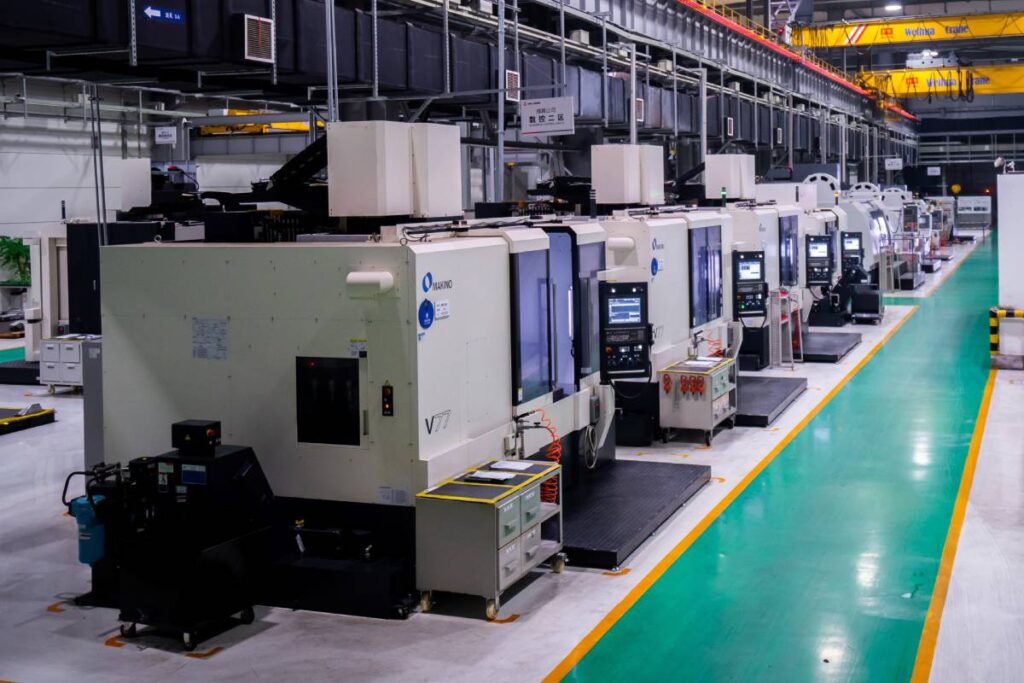Low-volume Production Service
Low-volume Production Bridging the Gap Between Prototype and Mass Manufacturing

Low-volume Production
At Star Future, our Low-volume Production services provide an ideal solution for businesses needing high-quality parts without the commitment of mass production. Whether you’re launching a new product, conducting market testing, or requiring specialized components, our Low-volume production capabilities ensure you receive the parts you need, when you need them.
What is Low-volume Production
Low-volume Production refers to the manufacturing of parts in smaller quantities—typically ranging from a few units to several thousand. It is is particularly beneficial for:
- Prototyping and Testing: Allows businesses to create functional products for validation before scaling up.
- Specialized Components: Ideal for custom parts that may not require large production runs.
- Market Trials: Enables companies to test products in the market before committing to full-scale manufacturing.
Our Low-volume production services provide the flexibility to meet your specific project requirements without the need for high upfront investments typically associated with mass production.
Our Low-volume Production Capbilities
Our metal 3D printing technology offers unrivaled design freedom and efficiency, making it ideal for creating complex geometries and lightweight structures.
Our 5-axis CNC machining capabilities ensure precision and flexibility in creating even the most intricate parts., allowing for precise machining of complex geometries and superior surface finishes.
Star Future offer sheet metal fabrication for custom enclosures, brackets, and components, enabling you to achieve the precise designs you need for your applications.
Our rapid tooling services can create molds and tooling for Low-volume production, allowing for faster setup times and reduced costs while maintaining high-quality standards.
Materials We Work With

Overview: A lightweight, corrosion-resistant metal with excellent thermal conductivity. It’s widely used in industries like aerospace, automotive, and electronics.
Key Properties: Lightweight, strong, corrosion-resistant, easy to machine.
Applications: Aerospace components, automotive parts, and electronics housings. Aluminum is commonly used for CNC machining, and sheet metal fabrication due to its ease of machining and thermal properties.

Overview: Known for its strength, durability, and excellent corrosion resistance, stainless steel is versatile across many industries.
Applications: Industrial equipment, medical devices, and structural components. Stainless steel is ideal for CNC machining and sheet metal fabrication, particularly in environments requiring chemical resistance.

Overview: A copper-zinc alloy with excellent machinability and corrosion resistance, often used in precision parts.
Applications: Electrical connectors, plumbing components, and decorative parts. Brass is commonly machined and used in Low-volume production due to its ease of fabrication and good electrical conductivity.

Overview: Known for its superior electrical and thermal conductivity, copper is widely used in electrical and heat-exchange systems.
Applications: Electrical wiring, heat sinks, and plumbing components. Copper’s machinability and conductivity make it ideal for precision CNC machining.

Overview: A strong, lightweight, and corrosion-resistant metal used in high-performance applications.
Applications: Aerospace parts, medical implants, and automotive components. Titanium is often used for CNC machining and 3D printing, especially in industries where strength and low weight are critical.

Overview: One of the lightest structural metals, known for its excellent strength-to-weight ratio and machinability.
Applications: Aerospace and automotive components. Magnesium is ideal for CNC machining and sheet metal applications where reducing weight is essential.

Overview: A tough, impact-resistant plastic often used in consumer products.
Applications: Automotive parts, electronic housings, and prototypes. ABS is commonly used for rapid prototyping and Low-volume production due to its ease of molding.

Overview: A strong, impact-resistant, and transparent plastic often used as a glass substitute.
Applications: Lenses, safety equipment, and electronics casings. PC is ideal for injection molding and rapid prototyping due to its strength and clarity.

Overview: A durable, flexible plastic known for its wear resistance and high mechanical strength.
Applications: Gears, bearings, and mechanical parts. Nylon is suitable for CNC machining, injection molding, and Low-volume production.

Overview: Also known as acrylic, PMMA is a transparent plastic with good UV resistance.
Applications: Display windows, light fixtures, and lenses. PMMA is commonly used in CNC machining and rapid prototyping for transparent parts.

Overview: Known for its high stiffness, low friction, and excellent dimensional stability.
Applications: Precision gears, bearings, and other mechanical parts. POM is often machined for precision components in Low-volume production.

Overview: A high-performance thermoplastic with excellent chemical resistance and mechanical properties.
Applications: Aerospace, medical devices, and high-performance engineering components. PEEK is commonly used in CNC machining and 3D printing for demanding applications.

Overview: A versatile, chemical-resistant plastic commonly used in lightweight applications.
Applications: Automotive parts, packaging, and consumer goods. PP is used in injection molding and Low-volume production due to its flexibility and ease of processing.

Overview: Known for its exceptional chemical resistance, low friction, and high temperature resistance.
Applications: Seals, gaskets, and non-stick surfaces. PTFE is often used in CNC machining and Low-volume production for applications requiring extreme chemical resistance.
One-stop Manufacturing Solutions
Whether you require a single prototype for design verification or mass manufacturing of final products, we have the solutions for you.

Rapid Prototyping
Our rapid prototyping capabilities enable you to validate designs, perform functional testing, and iterate quickly. With fast turnaround times and expert guidance, we help you refine your product concept efficiently, accelerating your development cycle and reducing time-to-market.

Low-volume Production
Our Low-volume production services bridge the gap between prototyping and mass manufacturing. Ideal for market testing, product launches, or niche markets, we offer flexible production runs typically ranging from 10 to 10,000 units.

Mass Production
We use high-speed CNC machining, and automated assembly lines to produce large quantities of your product. Our expert team optimizes your design for manufacturability, develops robust tooling, and implements stringent quality control measures to ensure consistent output.
Why Us
At Star Future, we don’t just manufacture parts—we accelerate innovation. Our capabilities in CNC machining, 3D printing, sand casting and more allow us to use the best process for every single part of your project. Here’s why industry leaders trust us as their end-to-end prototyping and precision manufacturing partner.


End-to-End Capabilities
Simplify your supply chain. We combine sand casting, multi-axis CNC machining, industrial 3D printing under one roof. No juggling vendors. No compatibility gaps.
Fast Turnaround
Get functional prototypes and pre-production samples fast. Our integrated processes slash lead times while maintaining rigorous quality standards.
Flexible On-demand Production
Whether you need 1 prototype or 500 bridge-production units, our flexible capacity grows with your project—without sacrificing speed or precision.
Cost-Effective
By eliminating the need for physical patterns and tooling, we significantly reduce upfront costs, making it economically viable to produce single prototypes or small batches of parts.
When you need experience, we have it covered
Our streamlined process ensures precision, efficiency, and complete satisfaction at every step.

Consultation what you need.
Our engineering team carefully reviews your CAD files, technical drawings, and specifications, engaging in detailed discussions about material choices, tolerance requirements, and surface finish needs.
Quote and order confirmation
You’ll receive a comprehensive quote that includes all specifications, deliverables, quality standards. Upon your approval, we move into the confirmation phase where all project details are thoroughly reviewed and finalized.
Manufacturing & quality control
During production, we maintain rigorous quality control through continuous monitoring and inspection processes. Our state-of-the-art CMM equipment verifies critical dimensions, while expert technicians conduct thorough surface finish inspections.
What they say about us
Welcome to leave any suggestions or comments about our services. Here are some comments from other customers




Ready for Manufacturing? Get a Free Quote & Expert Advice.
Have a CAD file or project specs? Our manufacturing engineers are ready to review your requirements and provide a fast, competitive quote for CNC machining, sand casting, 3D printing, or gear manufacturing.
Frequently Asked Questions.
We support all major CAD formats:
STEP, IGES, STL, SLDPRT, X_T, PARASOLID (and more).
Our engineers will review your design for manufacturability (DFM) and provide optimization suggestions before production begins.
We offer a wide range of materials for various manufacturing processes, including:
- Metals (Aluminum, Steel, Titanium, etc.)
- Plastics (ABS, Nylon, Polycarbonate, etc.)
- Composites and specialized materials depending on the application. We also provide material consultation to help you select the most suitable materials for your project.
Absolutely. Our 5-axis CNC machining centers (±0.01mm) and industrial 3D printers excel at:
Intricate designs, thin walls, and internal features
Tolerances down to ±0.025mm for critical dimensions
Challenging materials (e.g., Inconel, PEEK, tool steels)
Absolutely! We offer a wide range of surface finishes and post-processing options to enhance both the appearance and functionality of your parts. Whether you need polishing, anodizing, painting, or another specific finish, we can accommodate your requirements.
Lead times vary depending on the service and project complexity. Rapid prototyping can typically be completed within a few days, while more complex manufacturing projects such as Low-volume production or tooling may take longer. Once we receive your project specifications, we’ll provide a detailed timeline.
